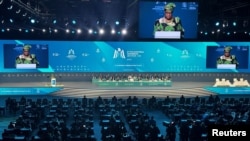ABU DHABI — Ministers from across the globe are gathered at the World Trade Organization (WTO) Ministerial Conference in Abu Dhabi to try to set new rules for global commerce, including reforming its dispute system and cutting fishing subsidies.
Expectations for the biennial meeting being held February 26-29 are modest amid growing disregard for trade rules, as the nearly 30-year-old body grapples with global geopolitical tensions and the risk of world trade breaking up.
The meeting started with East Timor and the Comoros joining the organization — the first countries to do so since 2016. Negotiations on Tuesday start with fisheries, although India's trade minister, seen as the main holdout in global trade negotiations, has not yet arrived.
Here is an overview of the key issues under the spotlight at the conference:
Reform
The WTO is trying to finalize a package of reforms to address the way it adjudicates trade disputes.
Its top court has been mothballed for four years because of U.S. opposition to new judge appointments, leaving trade disputes worth billions of dollars unresolved.
A draft proposal is seen as the last chance for the WTO to fix the system but proposals up to this point have not mentioned how to reboot the court because of a lack of consensus and obstacles abound.
WTO Director-General Ngozi Okonjo-Iweala praised progress in talks but seemed to rule out the chances of a deal at the Abu Dhabi meeting. "We are not there yet," she said.
Currently, countries can still file complaints to a lower body but if they do not accept its findings, the case ends up in legal limbo where some 30 unresolved appeals now sit.
Fishing
Environmentalists say knocking out billions of dollars in subsidies that promote unsustainable fishing is the single most important thing states can do to help reverse declining stocks.
Countries clinched a deal at the last ministerial meeting in Geneva in 2022 on banning some subsidies, including for illegal fishing and high seas stocks.
But negotiators arguably left the most thorny issues on subsidies - those that contribute to overcapacity and overfishing - unresolved. "It will hurt if you have to make cuts but I think there's hope," Anna Holl, the World Wide Fund for Nature's global lead on the WTO talks, said.
One challenge is to determine exactly who is bound by the toughest rules under a two-tier system.
Many countries, such as India, are lobbying for carve-outs using WTO rules that allow some exemptions for developing economies. Another outstanding question is whether China, the world's biggest fishing subsidizer, will seek this treatment.
More than 200 scientists have urged negotiators to complete the talks, which began nearly 20 years ago.
WTO officials hope the first part of the agreement will soon gain the approval of two-thirds of the body’s 164 members and come into effect. So far, more than 70 members have signed on.
E-commerce
WTO members do not currently agree on whether to extend what is effectively a ban on applying duties to electronic transmissions. The moratorium, in place since 1998, will expire this year if no agreement is made.
Analysts say this could see countries introduce customs duties on items such as film downloads, a move strongly opposed by business lobbies.
New Zealand Trade Minister Todd McClay, who is facilitating the discussions, told reporters he was "feeling positive" that opposition from a handful of countries, including India and Indonesia, could be surmounted.
"There's one or two areas that remain stubborn and challenging but we have a pathway forward to discuss them."
Agriculture
No decisions are expected on agriculture, according to Edwini Kessie, director of the WTO's Agriculture and Commodities Division. "Right now the positions are too far apart. I do not think members are expecting definitive decisions on the negotiations at this meeting," he said at a February 26 briefing.
He added that WTO members wanted to agree on a work plan taking them to the next ministerial meeting.
The most heated exchanges have been around a push by India and a coalition of developing countries for a stand-alone permanent waiver to WTO rules that restrict domestic agriculture subsidies on food items including rice.
Kessie added he did not think India had changed its position in reaction to the latest farmers' protests in the country, just months before a general election.
Critics from developed countries including the United States say that negotiations on WTO rules on subsidies cannot be dealt with in isolation. Related topics include reducing domestic support to the farm sector and improving market access through applying peak tariffs or tariff rate quotas.
Investment agreement
Around 125 member states have agreed on a deal meant to simplify red tape, improve the investment environment and encourage foreign direct investment.
All members now have to agree to incorporate the Investment Facilitation for Development Agreement into the WTO’s legal architecture, a step needed to ensure the organization can supply resources to monitor compliance.
But a consensus at the meeting is not guaranteed and some countries have voiced opposition to smaller negotiating groups. "It could be bumpy," one trade delegate said.









Forum